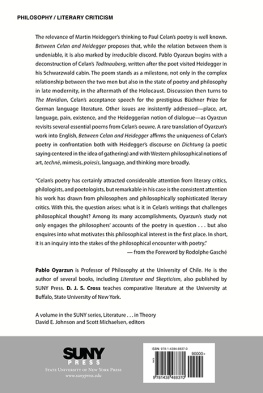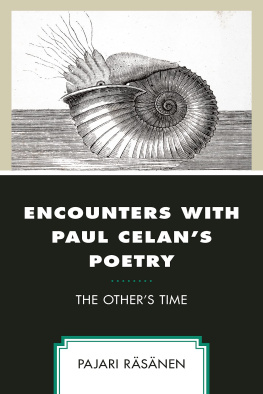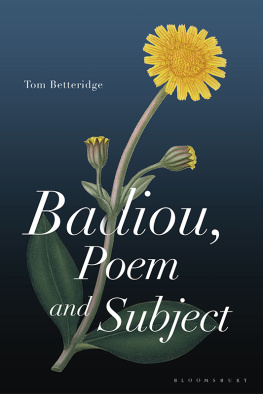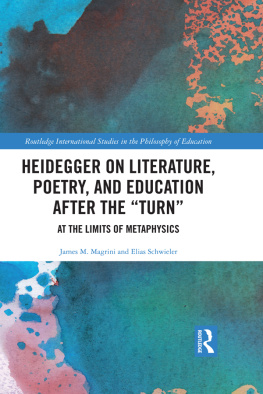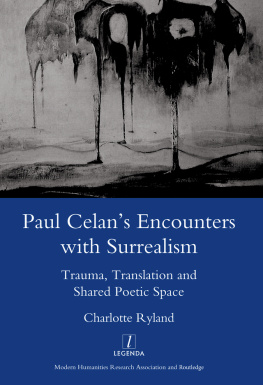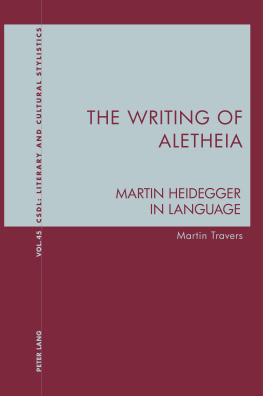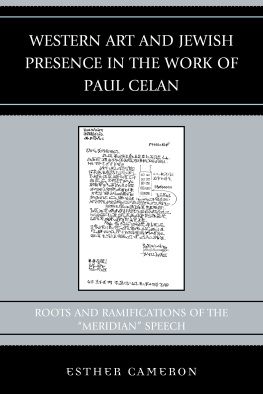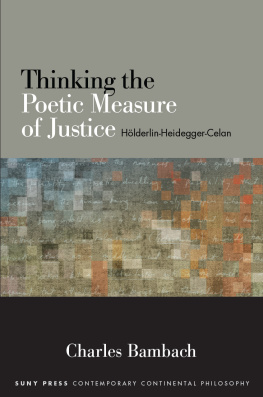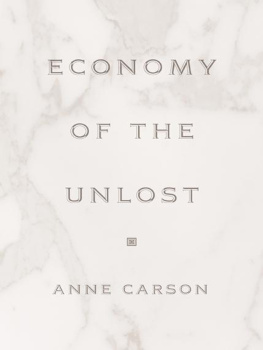Between Celan
and Heidegger

SERIES EDITORS
David E. Johnson, Comparative Literature, University at Buffalo
Scott Michaelsen, English, Michigan State University
SERIES ADVISORY BOARD
Nahum Dimitri Chandler, African American Studies, University of California, Irvine
Rebecca Comay, Philosophy and Comparative Literature, University of Toronto
Marc Crpon, Philosophy, cole Normale Suprieure, Paris
Jonathan Culler, Comparative Literature, Cornell University
Johanna Drucker, Design Media Arts and Information Studies,
University of California, Los Angeles
Christopher Fynsk, Modern Thought, Aberdeen University
Rodolphe Gasch, Comparative Literature, University at Buffalo
Martin Hgglund, Comparative Literature, Yale University
Carol Jacobs, German and Comparative Literature, Yale University
Peggy Kamuf, French and Comparative Literature, University of Southern California
David Marriott, History of Consciousness, University of California, Santa Cruz
Steven Miller, English, University at Buffalo
Alberto Moreiras, Hispanic Studies, Texas A&M University
Patrick ODonnell, English, Michigan State University
Pablo Oyarzun, Teora del Arte, Universidad de Chile
Scott Cutler Shershow, English, University of California, Davis
Henry Sussman, German and Comparative Literature, Yale University
Samuel Weber, Comparative Literature, Northwestern University
Ewa Ziarek, Comparative Literature, University at Buffalo
Between Celan
and Heidegger
Pablo Oyarzun
Translated by
D. J. S. Cross
Foreword by
Rodolphe Gasch

Cover image: Fr Paul Celan, 2005. Oil, emulsion, acrylic, charcoal, chalk, wood, metal, and plaster on canvas, 190 280 cm. Copyright Anselm Kiefer. Photo: Atelier Anselm Kiefer. Collection Albertina, Vienna.
The English translation of this book is possible due to the permission of Editorial Metales Pesados 2013.
Published by State University of New York Press, Albany
2022 State University of New York
All rights reserved
Printed in the United States of America
No part of this book may be used or reproduced in any manner whatsoever without written permission. No part of this book may be stored in a retrieval system or transmitted in any form or by any means including electronic, electrostatic, magnetic tape, mechanical, photocopying, recording, or otherwise without the prior permission in writing of the publisher.
For information, contact State University of New York Press, Albany, NY
www.sunypress.edu
Library of Congress Cataloging-in-Publication Data
Names: Oyarzun R., Pablo, 1950 author. | Cross, Donald J. S., translator. | Gasch, Rodolphe, foreword.
Title: Between Celan and Heidegger / Pablo Oyarzun ; translated by D. J. S. Cross ; foreword Rodolphe Gasch.
Other titles: Entre Celan y Heidegger. English
Description: Albany : State University of New York Press, [2022]. | Series: SUNY series, literature in theory | Includes bibliographical references and index.
Identifiers: LCCN 2021041525 | ISBN 9781438488370 (hardcover : alk. paper) | ISBN 9781438488387 (ebook)
Subjects: LCSH: Celan, PaulCriticism and interpretation. | Heidegger, Martin, 18891976Criticism and interpretation. | Aesthetics. | LiteraturePhilosophy. | Poetry.
Classification: LCC PT2065.E4 Z725913 2022 | DDC 831/.914dc23/eng/20211216
LC record available at https://lccn.loc.gov/2021041525
10 9 8 7 6 5 4 3 2 1
For Roxana,
by all paths
Contents
Rodolphe Gasch
The Idiom of the Poem
A Foreword
R ODOLPHE G ASCH
Compared to most of modern poetry, which has been qualified by its tendency toward muteness, Paul Celans poems pose a particular challenge to the reader. Indeed, according to The Meridian, Celans sole text on poetry, the poem does speak (Celan, Meridian, 31a). And yet, his poems, especially the later ones, are held to be impenetrable, obscure, or hermetic. However, on the other hand, obscurity and hermeticism are considered to be essential characteristics of modern poetry. Therefore, the question to be asked in the case of Celan concerns the kind of obscurity of his poems, especially since the poems speak in a language that has gone through terrifying muteness, through the thousand darknesses of murderous speech (Celan, Collected Prose, 34; translation modified). What kind of intelligibility characterizes an obscurity associated with poems that go through a language that experienced its own loss as a result of what happened [das, was geschah] and that are dialogically headed toward, that is, toward something open, inhabitable, an approachable you, perhaps, an approachable reality (35)? What kind of impenetrability might characterize a poem for which this experience is one that can no longer be attributed to some epochal distinction such as modern but also, even though it is closer to Hlderlinean poetry than to Goethean, no longer fits the Mallarman striving for the absolute and universal poem? When, in the Bremen speech, Celan famously speaks of the poem as a letter in a bottle thrown out to sea, he emphasizes not only that it speaks in hopes of an addressee but also, and especially, that the poem is always a singular address rather than an instance of an epochal genre, modern or not; in other words, the poem is not wearing a uniform (Dostoevsky, Writers Diary, 52), to quote in this context an unlikely source. If what is new about the poem today is that it stays mindful of its dates, this does not mean that it is modern but, rather, that it in a way belongs to a genre all by itself (Celan, Meridian, 31a). Perhaps this would even be something other than a genre to begin with! If, moreover, such a letter headed toward an Other is obscure, how does this destination shape its intelligibility? If, in all its obscurity, the poem is intelligible, it is because its singularity consists not in an individual personality and his or her purely personal or even idiosyncratic nature but, rather, in a resistance to all forms of understanding that, already in advance, have decided its meaning. Needless to say, since such singularity resists all appropriation, it inevitably remains obscure, but it is also, for this very reason, (minimally) intelligible as the universal trait of a singularity in all its irreducible uniqueness. This is thus an obscurity that must be respected, one that solely manifests itself in readings that themselves can and must remain singular. The reader of this foreword will by now already have understood that, hereafter, I will be interested in the readability and intelligibility of a poet who is also, as we will see, a thinker.
Pablo Oyarzuns Between Celan and Heidegger is a philosophers book on Paul Celan. There is nothing particular in this respect, since a number of prior thinkers have been drawn to the study of poetry. Within the present context, Martin Heideggers interpretation of Friedrich Hlderlinbut also of Rainer Maria Rilke, Georg Trakl, and Stefan Georgeis a case in point. Furthermore, though Heideggers interest in Celans poetry did not materialize in a written philosophical commentary on his work, Celans own complex and subtle debate, both in

